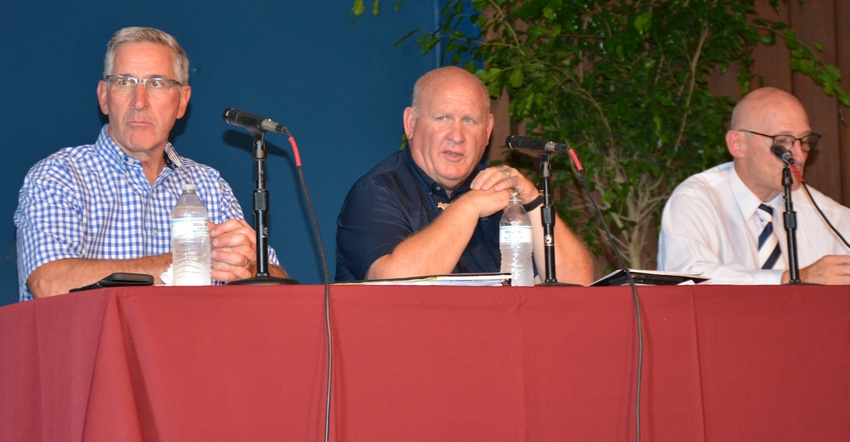
As chairman of the House Ag Committee, Rep. Glenn “GT” Thompson always has news from the Beltway to share with farmers, even if they’re just the standard talking points you might expect from a politician.
But his annual trip to Ag Progress Days is a chance for him to hear about issues on the ground, directly from farmers.
For 90 minutes on Wednesday, Thompson — along with Russell Redding, Pennsylvania secretary of agriculture, and Richard Roush, the dean of the Penn State College of Agricultural Sciences — heard from ag leaders and farmers themselves about the big issues facing farmers in the Keystone State.
Here are four issues that stood out:
1. Solar development. Carrie Nace, legislative director for Pennsylvania State Grange, said there is growing concern among her organization’s members about the loss of prime farmland to large-scale solar projects.
The Grange recently enacted a policy calling for the prohibition of large-scale solar projects on Class I and Class II soils, the highest-quality agricultural soils as classified by the Natural Resources Conservation Service.
“Farmers are getting priced out of the market when they are looking to rent land, or buy land, and they are concerned about the loss of it,” Nace said.
Thompson said the issue of solar leasing reminds him of the natural gas rush of the 2010s in northern and western Pennsylvania, when dozens of gas companies gobbled up land leases and developed wells on the Marcellus Shale formation.
Thompson said there should be incentives for companies to develop projects on unproductive farmland, whether it’s abandoned mine lands or slopes where the risk for soil erosion is higher.
Roush said solar companies prefer large swaths of flat farmland because it’s easier to install the systems and connect them to the grid.
Redding said the issue comes down to local zoning laws and how local governments plan for development and preservation of farmland.
2. Attracting young farmers. One attendee talked about ways to help preserve small- and medium-sized farms, and get more young people excited about careers in the business.
Thompson touted a bill that he co-sponsored last year, the Growing Opportunities in Agriculture Act, that would create a $5 million grant program to help high schools cover the startup costs associated with agriculture education programs.
Demographically, the ag community is facing a problem, Roush said. Not enough next-generation farmers are out there to take over the land, so educating people early is key.
“We have to be able to recruit some people from cities,” he said. “It seems to me that if you want to inspire somebody, you get them on a farm when they’re young, and they can see what the future is.”
3. Development and bay cleanup. Jeff Swinehart, president and CEO of Lancaster Farmland Trust, and chairman of Lancaster Clean Water Partners — which brings together county organizations with the shared goal of cleaning up all the county’s impaired waters by 2040 — said the threat of development and insufficient funding for county water cleanup efforts will threaten more farmland if changes aren’t made.
Swinehart said a recent report by American Farmland Trust placed Lancaster County — along with Chester and York counties — at the top of counties that have lost productive farmland since 2016. The report estimates that another 27,000 acres of productive farmland could be lost by 2040 — 18,000 acres of which are outside the county’s designated growth areas.
The county is also a big target when it comes to Chesapeake Bay nutrient reductions. Swinehart says that 22% of the bay’s overall nitrogen reductions must come from Lancaster County. He says the county receives about $20 million a year to pay for water quality projects, but most of these are small grants capped at $1 million, which is not enough to pay for shovel-ready projects, many of which are on farms.
He says the county needs about $70 million to meets its nutrient reduction requirements under the federal Total Maximum Daily Load set up by the Environmental Protection Agency.
Thompson said farmers don’t get enough credit for what they’re doing already, and that the state isn’t benefiting from working with other bay states.
“I don’t think it has been helpful to be in the Chesapeake Bay compact,” Thompson said, referring to the 2014 agreement that committed all watershed states and the District of Columbia to full partnership in the Chesapeake Bay program, the consortium of governments, nonprofits and academic institutions that lead the bay’s cleanup efforts.
“Because we have other states that are allowing huge homes with huge lawns that get chemicals on them on a regular basis to be built on the Chesapeake Bay, and we have these folks and those governors that are accusing Pennsylvania of being the problem,” Thompson added.
4. Mentoring future mechanics. Tim Wentz, field director for the Northeast Equipment Dealers Association, said dealers can’t find enough skilled mechanics to fill jobs, leading to overworked mechanics and new people who aren’t getting trained properly.
He said current mechanics are in need of training to help them teach new mechanics how to fix modern machines, which are becoming more electrical and computerized than ever before.
He also called for middle school mentoring programs to get more young people excited about careers in ag machinery repair.
“Today’s equipment is much more computerized, much more advanced,” Wentz said. “It takes real skill how to troubleshoot, and it’s going to get more like this. So you have to have techs who understand this.”
About the Author(s)
You May Also Like






